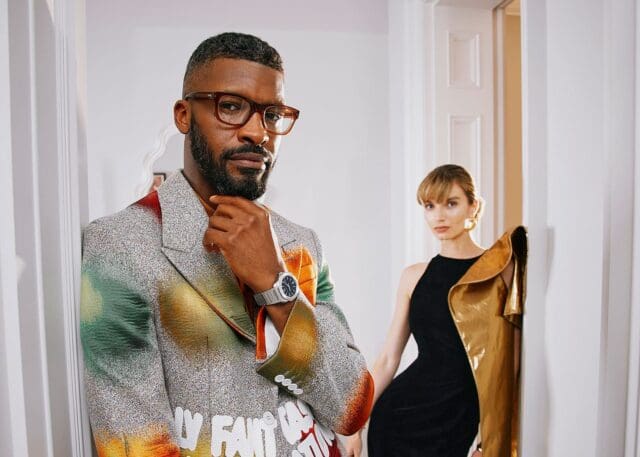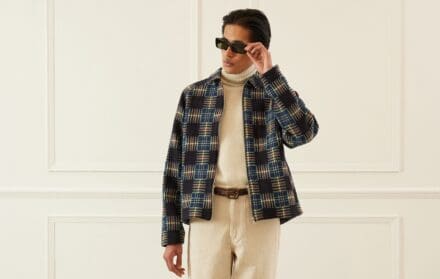
Introducing Tengri– the innovative yak-fibre brand shaking up Savile Row
In Mongolia, a co-operative of nomadic herders are steering a sartorial revolution. Led by Tengri, a yak-fibre manufacturer founded in response to the harmful effects of the cashmere industry, the movement is pioneering a new sustainable
All products are chosen independently by our editors. Luxury London may earn commission on items purchased.
When Nancy Johnston lost her job in 2013, she packed her bags and set off to travel the world in a bid to find her calling. In a yurt in the Khangai mountains of Mongolia, where the landscape is sparse and the climate can be unforgiving, she found it. While staying with a nomadic herder family, she discovered that demand from the cashmere industry and the resulting increase in goat herding was devestating the land. Goats, she learnt, have a more destructive grazing manner than other animals, and their feet, though small, trample the fragile terrain. To meet the demand from the fashion industry, Mongolia’s herders were rearing more goats than the ground could take, and in turn their lives and livelihoods, which hinge on the health of the land, were beginning to look at risk.
Johnston suggested yak hair as a sustainable alternative. Previously overlooked (it was literally discarded by the herders, who rear yak for milk and meat), yak hair promised the same qualities as cashmere but at a far less crippling cost to the environment. Johnston launched her company Tengri in the same year, connecting nomadic herders in Mongolia with British craftspeople in Yorkshire and Savile Row. In doing so, she gave new life to a centuries-old community that was struggling to survive. Here, she tells the Tengri story.


Tengri came about by accident really, serendipity — or maybe it was fate. I saw a picture of Mongolia when I was a child and it inspired me to travel and help people. I worked in the charity sector in the UK for many years, and in 2013, when I was made redundant, I remembered that picture of Mongolia and hopped on a plane. I lived with a nomadic herder family, and on the first morning there I was served tea by a young mother who had no milk because all of her animals had died. She was just so embarrassed. It turned out that Mongolia is the second largest supplier of luxury fibres in the world and all of her animals had died because the land was overgrazed and stripped. I was just flabbergasted from this experience, that a simple little cashmere jumper that we wear here in the West could devastate whole countries, in one of the harshest environments in the world, and with one of the largest indigenous communities on the planet.
During that trip, I also found out that these incredible animals bear fibres with unique natural properties. It’s as soft as cashmere, warmer than merino, odour resistant, water resistant and hypo-allergenic; it’s an amazing miracle fibre that the world didn’t even know about. I went back to London, the home of innovation, fashion and international business, and I said well you just need a brand to bring these luxury fibres to market. I bought my first tonne of yak fibres and in a very short time the herders were training in a cooperative. There were 140 families at the time, and within one year 1,500 families signed up to join, and that snowballed into 4,500 families. It became a national federation, where all the nomadic families pulled together to form this national collective to trade fibres. The income of the herder families has increased by 18 fold as a result of our work and the collective action by the nomadic herders. They’ve been given the land rights and recognition by the government that they once didn’t have.

When I set up the company with the herders, I needed a name for the brand and I needed something that was representative of their culture. My friend was living in Mongolia at the time and had this cat called Tengri. Tengri is the old script for the Mongolian sky god, and I just loved the name. When I asked the herders if it was okay if I used the name of their god for the company, they gave me their blessing, and said if you’re going to do this you have to make sure you give it the highest honour. So I made sure we worked with absolutely the best manufacturers and the best tailors, who will appreciate this noble fibre. In terms of textiles, noble means something rare and exotic, but for us at Tengri we used the word noble with a double meaning: a noble cause. Everything made out of this product has a noble cause that feeds back to the land, the animals and the people.
Our first tailoring collaboration was with Huntsman. When I developed the yarn, I was advised I needed to produce the best fabrics in the world, and the best fabrics in the world are used by Savile Row. It was London Craft Week at the time and I booked an appointment with Huntsman. I mentioned to Campbell Carey, the creative director, that I was creating this rare fabric, and he asked me to bring it in. When I brought the fabric and told him about the properties of it, he poured some water over it, shook it, and he could not believe that the fabric just beat it off. We sold out exclusively to Huntsman, and that was how we launched our first fabric. Soon after, I met a few more tailors and over time we have slowly started getting requests from clients of Savile Row tailors.


We have a 100 per cent transparent supply chain. I know every single hand and family that has touched the fibre, including freight agents in Mongolia, freight agents in the UK, the logistics team that transport to our mills in Yorkshire; every one of those companies I’ve met, signed the contracts with and seen how they work. It fills me with so much joy to see everybody having a little piece of the global jigsaw puzzle that is creating just one item. The unique aspect is being able to share the final outcome of the customers’ journey with the nomadic herders. They just can’t believe that this little fluff in their hand could become this luxurious thing halfway around the world. It’s an end-to-end global community story.
Tengri started from a natural disaster, so we’ve built it based on preventing that in the future. Surprisingly, the pandemic hasn’t affected our work that much, apart from our manufacturers have had to close for a bit. I’ve designed the whole entire Tengri business model to be quite agile. I think in fact the pandemic has helped to reinforce the message about slow and sustainable fashion, buying what’s needed, what’s wanted, what’s useful and what will be cherished. And that’s how we manufacture and make, so in a way that’s how the pandemic has affected Tengri — it really has enforced what we do.

There have definitely been a lot of changes in the fashion industry over the past seven years. When I started, sustainability was very niche, and most people looked at it from the manufacturing side or the ethical side; nobody really talked about climate change and nobody talked about or understood the connection with agriculture and the land. It’s been nice to see a lot more brands considering a wider perspective that didn’t exist before. It’s a really important, exciting new trend and hopefully it will continue to be that way. We have no other choice – we just have to consider the environment.
We are also developing capabilities of yarn bio-waste, with new manufacturing techniques to create new woven and non-woven fabrics that have never existed on the market. We’ll be expanding with a whole range of ancient fibres that have existed for thousands of years, but have been overlooked by the industry to date, and we’ll be launching exciting new lines of fabrics with amazing properties, no additives or environmentally harmful treatments – just respecting and designing based on nature.









